(RNS) It’s list-making time, and this year I begin a new one – the top Jewish-making news stories. Here are my picks for 2015:
1. Anti-Semitic attacks escalate across Europe.
In January an Islamic terrorist killed four Jews inside a Paris kosher market, and in February a terrorist killed a synagogue guard in Copenhagen. The number of French Jews moving to Israel grew during the year.
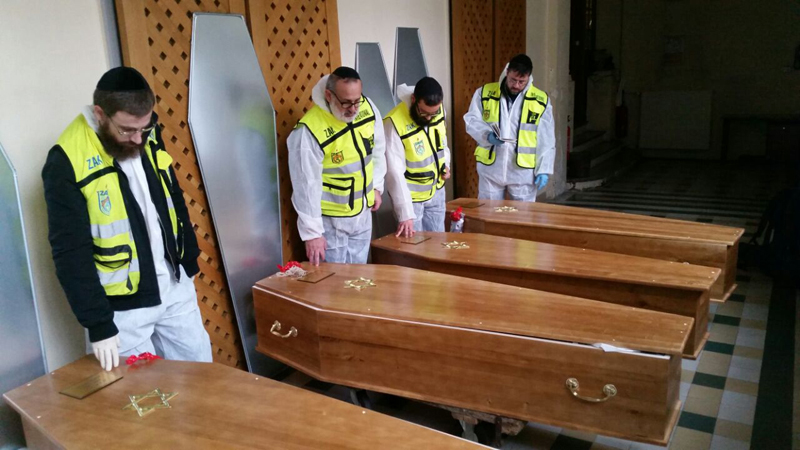
Members of the Zaka emergency response team pray beside the coffins of four victims of an attack at a kosher supermarket, before their transport from Paris to Israel for burial, in Paris, in this picture released by Zaka on January 12, 2015. Photo courtesy of REUTERS/Zaka/Handout via Reuters
2. American Jews divide over Iran.
In March Benjamin Netanyahu was re-elected Israel’s prime minister. Earlier that month, Netanyahu addressed a joint session of Congress on the dangers of the proposed Iran nuclear agreement. In September, despite Netanyahu’s opposition, a multinational accord was approved, but the public debate on the issue created rancor within the American Jewish community.
3. The BDS campaign gathers force.
In June, the General Synod of the United Church of Christ approved a resolution calling for the denomination to divest and boycott certain companies doing business with Israel. Critics charged the UCC and other boycott, divestment and sanction proponents were one-sided because they avoided any condemnation of the so-called Islamic State’s often murderous persecution of Middle East Christians and other religious minorities, the slaughter of innocents in the Syrian civil war, and other horrific human rights abuses in the region.
READ: United Church of Christ votes to divest from Israeli companies in occupied territories
Following the BDS vote, UCC President John Dorhauer, questioned “if the benefits of our divesting from those companies is equal in cost to the relationships that we have with people who are critical to our movement towards justice.”
4. Jewish women in Israel make strides to achieve religious equality.
The “Women of the (Western) Wall” organization continued the fight for the right of women at Judaism’s holiest site to read from the Torah scroll, sing and pray, wear religious garments, and exercise other rights granted to men. Despite opposition from many Orthodox Jewish leaders, progress continues to be made, albeit slowly. (In the U.S., Rachelle David of Syosset, N.Y., was the first female graduate of an Orthodox yeshiva to become a cadet at West Point.)
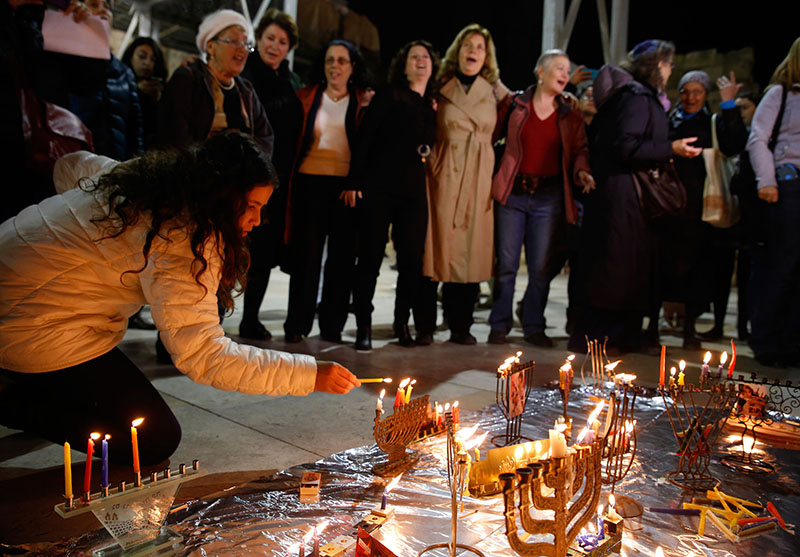
In 2014, Women of the Wall, a feminist prayer group, defied a directive by the rabbi of the Western Wall banning women from lighting Hanukkah candles in the women’s section of the Western Wall. On Nov. 30, 2015, Israel’s deputy attorney general said that women are permitted to do so. Religion News Service photo by Ricki Rosen
READ: End ban on women reading Torah at Western Wall, group petitions
5. Yeshiva University’s fiscal crisis deepens.
The New York City institution, the educational flagship for Orthodox Judaism, faced a nearly $600 million debt that threatened its existence. In March, the faculty adopted a no-confidence vote reflecting dissatisfaction with President Richard Joel’s leadership, but the university board of trustees voted to support him. The faculty of the all-male YU was merged with the faculty of the university’s all-female Stern College.
6. U.S. Sen. Bernie Sanders launches a Democratic presidential campaign.
Although Sanders, Independent Vermont senator, is a self-professed “secular Jew,” and is unlikely to win the Democratic nomination, for many people he is the political personification of the strong Jewish religious commitment to social justice concerns.
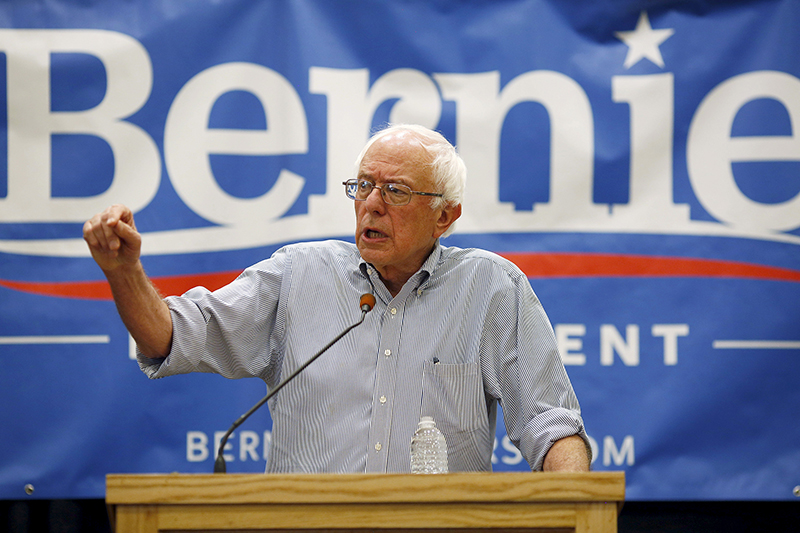
Vermont Senator and U.S. Democratic presidential candidate Bernie Sanders speaks at a campaign town hall in Manchester, N. H., on August 1, 2015. Photo courtesy of REUTERS/Dominick Reuter
*Editors: This photo may only be republished with RNS-SANDERS-LIBERTY, originally transmitted on August 6, 2015, or with RNS-RUDIN-COLUMN, originally transmitted on Dec. 21, 2015.
READ: 5 faith facts about Bernie Sanders: unabashedly irreligious
7. Spain atones for the Inquisition.
The country granted citizenship to 4,302 Jews whose ancestors in 1492 were forced to flee Spain rather than convert to Catholicism or burn at the stake. It is estimated that 200,000 Jews lived in Spain then; today their descendants number 3.5 million people.
8. Catholics and Jews marked the 50th anniversary of ‘Nostra Aetate.’
The declaration, Latin for “In Our Time,” was approved at the Second Vatican Council in 1965, setting in motion a half-century of greatly improved relations between Catholics and Jews.
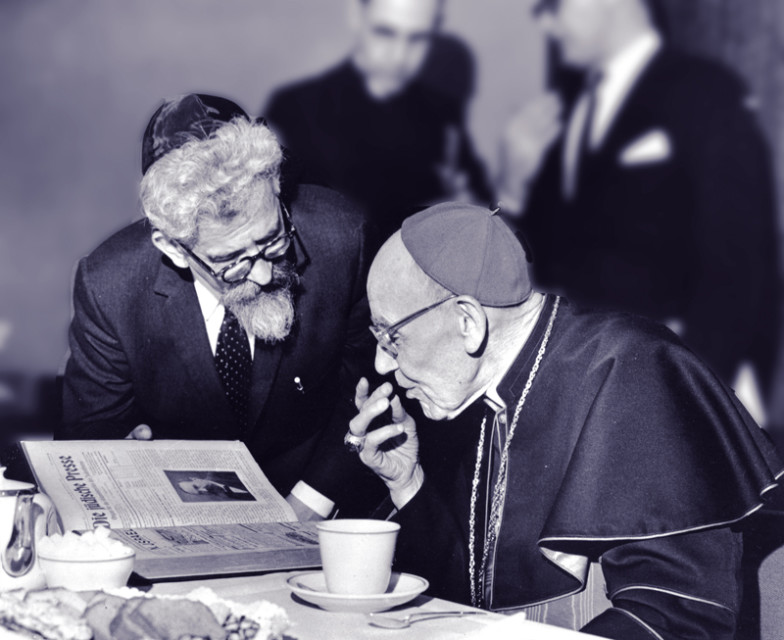
Rabbi Abraham Joshua Heschel meeting in New York with Cardinal Augustine Bea, who shepherded the process of Catholic introspection that led to “Nostra Aetate,” on March 31, 1963. Photo courtesy of American Jewish Committee
READ: The ‘Splainer: What is ‘Nostra Aetate,’ and what does it have to do with Catholic-Jewish relations?
At year’s end, a new Vatican statement asserted the Catholic Church “neither conducts nor supports” conversion efforts directed at Jews who, the document affirmed, do not require conversion to Christianity to gain spiritual salvation. The Vatican also pledged to combat anti-Semitism. In October, Pope Francis declared: “To attack Jews is anti-Semitism, but an outright attack on the State of Israel is also anti-Semitism.”
9. Two prominent rabbis charged with sexual impropriety.
In Washington, D.C., Barry Freundel began a six-year prison sentence for 52 counts of voyeurism, including videos, of naked women immersed in a mikvah, a Jewish ritual bath. In New York City, Jonathan Rosenblatt was accused of inviting boys from his congregation to join him in a sauna. Rosenblatt’s synagogue board voted 34-8 to fire him, but the board chairman and president overrode the action.
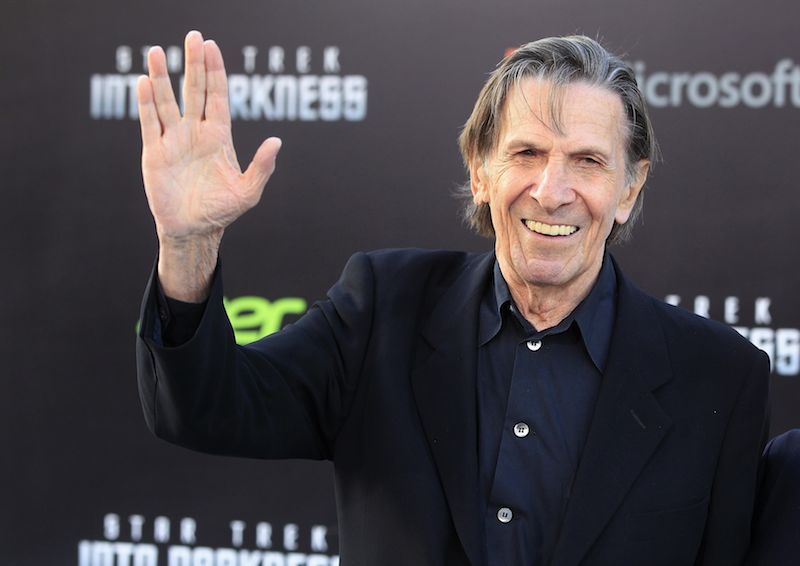
Leonard Nimoy, cast member of the film “Star Trek Into Darkness,” poses as he arrives at the film’s premiere in Hollywood in this May 14, 2013, file photo. Leonard Nimoy, the actor famous for playing the logical Mr. Spock on the television show “Star Trek,” died Feb. 27, 2015 at age 83. Photo courtesy of REUTERS/Fred Prouser/Files
READ: ‘Peeping Tom’ rabbi sentenced to more than 6 years
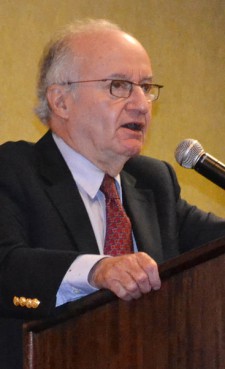
Rabbi A. James Rudin, the American Jewish Committee’s senior interreligious adviser, is the author of “Cushing, Spellman, O’Connor: The Surprising Story of How Three American Cardinals Transformed Catholic-Jewish Relations.” RNS photo courtesy of Rabbi A. James Rudin
10. Leonard Nimoy and Oliver Sacks pass on.
Other notable 2015 deaths included Novelist E.L. Doctorow; Weavers folk singer Ronnie Gilbert; former Israeli President Yitzhak Navon; Major League Hall of Famer Al Rosen; Hungarian-born World War II American Medal of Honor recipient and Holocaust survivor Tibor Rubin; neurologist Oliver Sacks; former Rome Chief Rabbi Elio Toaff; historian Robert Wistrich, and my rabbinical school classmate, Rabbi Walter Zanger.
(Rabbi A. James Rudin is the American Jewish Committee’s senior interreligious adviser. He can be reached at jamesrudin.com)




